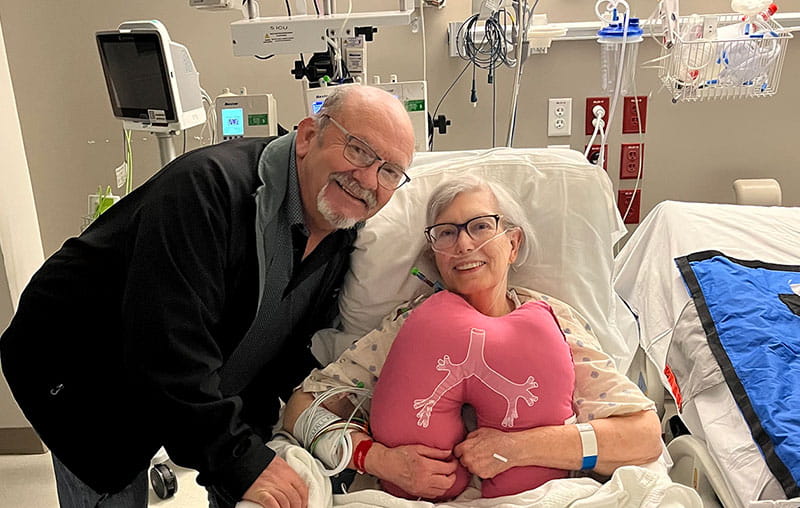Did you know that in people younger than 50, colorectal cancer diagnoses have gone up in the last 10 years? According to the American Cancer Society, “rates have increased by 2.4% per year from 2012 to 2021.”
"Getting screened and going to annual checkups are more important than ever," said Dr. Pavlos “Paul” Kaimakliotis, an advanced therapeutic endoscopist with University Health. To catch colon cancer early on, Dr. Kaimakliotis recommends asking your provider about getting a colon cancer screening at your next visit.
In the meantime, learning about risk factors can help lower your chance of getting colon cancer.
Why Prevention Matters
“Something as simple as a cancer screening can save your life,” says Dr. Kaimakliotis. Even if you don’t have any symptoms of colon cancer, most people should start getting screened after the age of 45.
A colon cancer screening, like a colonoscopy, will show your provider if there are any abnormalities in your colon. These may include polyps, abnormal cells, inflammation or ulcers that may indicate future cancer development.
Catching the early signs of colon cancer gives you a much better chance of making a full recovery because it is less likely to have spread. Plus, precancerous polyps found during a screening can be removed, preventing its risk of turning into cancer.
Learn about the different screening methods, their pros and cons, and ways you can reduce your risk for developing colon cancer.
Colon Cancer Risk Factors
Some factors put you at a greater risk of developing colon cancer. While some are uncontrollable, like age and family history, others can be changed and lower your risk.
Risk factors you can change include:
- A diet high in red meat
- A low-fiber diet
- Obesity
- Smoking
- Excessive alcohol consumption
Risk factors you cannot change include:
- Type 2 diabetes
- Inactivity
- A family history of colorectal cancer
- Being Ashkenazi Jewish, Alaska Native or Native American
- History of inflammatory bowel disease
If you have any of these risk factors, your primary care provider may recommend screening for colon cancer before you turn 45.
Schedule an appointment with one of our providers today.
Screening Increases Your Chance of Survival
Screening saves lives. When screenings detect polyps and abnormal cells early, and the cancer has not spread outside the colon, the five-year survival rate is 91%. This means that five years after being diagnosed with early-stage colon cancer, 91% of people were still alive.
6 Ways to Lower Your Risk for Colon Cancer
Start Screening at 45 or Sooner
Dr. Kaimakliotis recommends most people without risk factors begin screening for colon cancer soon after they turn 45. People with risk factors can begin screening at age 40.
According to the Centers for Disease Control and Prevention, getting screened is the best way to prevent colon cancer. Learn about different screening options below.
Screening Options
|
Test |
Frequency |
Pros |
Cons |
|---|---|---|---|
|
Colonoscopy |
Every 10 years |
1. The most accurate screening for detecting abnormalities 2. The only screening allowing detection and removal of pre-cancerous polyps |
1. Requires laxatives which cause diarrhea the night before 2. Usually requires sedation 3. Small chance (<1%) that your rectum or colon will be punctured |
|
Stool-Based Tests |
Yearly or once every 3 years, depending on the test |
1. Less invasive than colonoscopy 2. Samples can be collected at home 3. They don’t require “bowel prep” laxatives to clear out your system |
1. They may miss some pre-cancerous polyps and cancers 2. If there are abnormalities, the patient will still need a colonoscopy |
|
Flexible Sigmoidoscopy |
Every 5 years, or every 10 if paired with FIT stool test. |
1. Your provider can remove tissues or polyps to test for cancer 2. Less risk of damage to colon and rectum 3. It is a shorter screening than a colonoscopy |
1. If abnormalities are found, you will still need a full colonoscopy 2. Requires laxatives the night before |
|
CT Colonoscopy |
Every 5 years |
1. Better detection than stool samples 2. Use of X-rays is less invasive than colonoscopy 3. No sedation |
1. Requires laxatives to clear rectum and colon, causing diarrhea the night before 2. Exposure to some radiation 3. If there are abnormalities detected, the patient will still need a colonoscopy |
Eat a High-Fiber Diet
Eating more fiber is a simple adjustment that can significantly improve your gut microbiome. Dr. Kaimakliotis says when you get enough fiber, the healthy bacteria in your colon reduce inflammation and boost your overall gut health.
According to this study, only 5% of Americans are getting enough fiber in their diet.
So how much fiber do you need? It depends on your age and sex.
Age 50 and younger:
- Women: 25 grams/day
- Men: 38 grams/day
Age 51 and older:
- Women: 21 grams/day
- Men: 30 grams/day
Foods High in Fiber
- Raspberries
- Pear
- Apple
- Banana
- Green peas
- Broccoli
- Whole wheat pasta
- Quinoa
- Lentils
- Black beans
- Chia seeds
Maintain a Healthy Weight
Getting to and maintaining a healthy weight is key to lowering your risk for colon cancer. One study shows a clear link between shedding excess weight and reducing colon inflammation, which can lead to cancer.
Exercise Frequently
Staying active is one of the best things to do for overall health. While vigorous exercise is best for lowering your risk for colon cancer, light and moderate exercise make a big difference, too. This study suggests regular, consistent exercise can lower your risk for colon cancer by as much as 24%.
Quit Smoking
Quitting smoking is another lifestyle change that can reduce your risk for colon cancer.
Research suggests that people who smoke cigarettes are more likely to develop colon cancer. An analysis of multiple studies found that the risk for developing colon cancer was 20% higher for people who had ever smoked, compared to those who have never smoked.
If you need help quitting, learn about our community resources from University Health’s Institute for Public Health.
Limit Alcohol Consumption
Drinking alcohol raises your risk for several types of cancer, including colon cancer. This is because ethanol, the alcohol found in liquor, beer and wine, “can disrupt cell cycles, increase chronic inflammation, and damage your DNA,” according to the CDC.
Limiting alcohol to 1 drink a day for women and 2 drinks a day for men can mitigate the risk. Some studies show that limiting or completely restricting your alcohol intake can reverse the damage and lower your risk, though it may take years.
Your Colon Cancer Prevention Checklist
- Understand your personal risk factors
- Schedule your screening
- Add fiber-rich foods to your shopping list
- If you smoke, work on quitting
- Drink alcohol in moderation (1-2 drinks per day at most)
- Lose extra weight
- Get 150 minutes of moderate to vigorous exercise each week
If you are unsure where to start with colon cancer prevention, Dr. Kaimakliotis says it’s best to reach out to your primary care provider for guidance.





